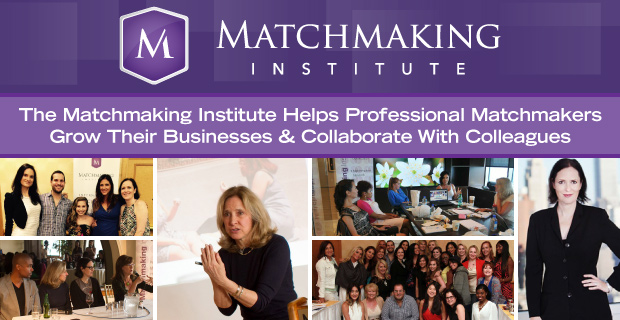Wall Street Journal – December 2003
You’re at a coffee shop, and you spot a beautiful woman alone at a table. Mustering up your warmest smile, you approach. Her eyes meet yours. Wow! She’s even prettier up close. That’s when you give her your best line.
“I have a friend,” you say, “who might be perfect for you.”
U.S. dating-service businesses are expecting revenue of $1.1 billion this year, up 25% from 2002. But there may be a cheaper way to deliver happiness to the nation’s 83 million singles: More of us need to play matchmaker to our friends and loved ones.
“If enough people would look out for their friends, I’d be out of business,” says Barbie Adler, founder of Selective Search Inc., an elite Chicago-based matchmaking service that charges clients between $5,000 and $105,000. It takes a combination of the old-world yenta and today’s savvy business models: “You have to be a shrink, recruiter, broker, cheerleader, confidant and manager,” she says.
Lisa Chaben, a 39-year-old mother in suburban Detroit, tries to be all these things. In the past 22 years, her fix-ups have led to 38 marriages. Thirty brides have thanked her by making her a bridesmaid. “I’ve always wanted to create fairy tales,” she says.
Randy Lewis, an attorney who met his wife through Ms. Chaben, says the amateur matchmaker is a natural at sizing people up. “She has an ability to take in everything about you, and does it in a way where you don’t know she’s prying,” he says.
Ms. Chaben is always on the prowl. In 1991, she was in a doctor’s office, met an older divorced woman, and promised she’d remain on the lookout for a good older man. Three years later, after Ms. Chaben’s mother-in-law died, she decided that the woman, Joannie Barker, would be perfect for her widowed father-in-law. They’ve since married.
These days, matchmakers like Ms. Chaben are getting inspired on many fronts. A new NBC TV show, “Miss Match,” chronicles a divorce lawyer turned matchmaker. A mother in Southbridge, Mass., recently received national attention after she tried to find her 23-year-old daughter a soul mate by holding front-lawn auditions. And this past weekend in New York, 20 women attended a $750 seminar hosted by the Matchmaking Institute, a school for would-be Cupids.
Studies show that 30% of online dating-site visitors are married, and countless others misrepresent themselves. So it’s far safer to get fixed up by people who know you.
Still, there are risks when friends or loved ones act as matchmakers. It can be exasperating when a mother directs a million-man march to her daughter’s doorstep. Also, some people might not have the bull-detector needed to plot fix-ups. I once interviewed a man who’d been on 137 blind dates. He warned that singles should never trust the clergy to be matchmakers because “they see only the good in people.”
“You can’t just throw two people together because they’re both single,” says Matchmaking Institute founder Lisa Clampitt; you have to weigh people’s energy levels, priorities, values and vulnerabilities.
Networking is key, too. “Barter,” says Ms. Adler. “If you’re in the luggage business, say, ‘Find me someone for my friend and I’ll give you a suitcase.’ The old matchmakers did that. They’d trade pigs and hens for a man.”
Meanwhile, if your friends have bad breath or need haircuts, work with them. Before fix-ups, Ms. Chaben helps some women build self-esteem by taking them to the gym or encouraging them to sit in a bookstore, reading alone, figuring out what interests them. She intends to make matches into her old age. “I’ll be running the bingo in Boca,” she predicts.
Of course, a lot of matchmaking is just fostering proximity and hoping for magic. Before returning to The Wall Street Journal, I spent 14 years as a columnist at the Chicago Sun-Times. Each September, I’d host a charity event, “Zazz Bash,” attended by 7,000 single readers. Over the years, the giant party led to at least 78 marriages.
Often, partygoers became matchmakers themselves. At the 1992 bash, attorney Rob Rotman was approached in the men’s room by a stranger who said, “I have a beautiful friend. I’d like you to meet her.” The stranger, Yomi Ahmed, said his co-worker, Linda Rumps, deserved a wonderful man. Mr. Rotman, then 27, was taken aback, but agreed to meet her a week later at a restaurant. They’re now married with two children.
Mr. Ahmed had never before found anyone worthy of Ms. Rumps. He can’t pinpoint why he approached Mr. Rotman. “Maybe it was his smile,” he says, adding that in Nigeria, his birthplace, such “instinctive” matchmaking is routine.
When you play matchmaker and love blooms, it can feel like you’re doing God’s work. But you also might notice people running away as you approach. Mr. Lewis says the word is out in suburban Detroit: “If you’re not looking to get married, stay away from Lisa Chaben.”



